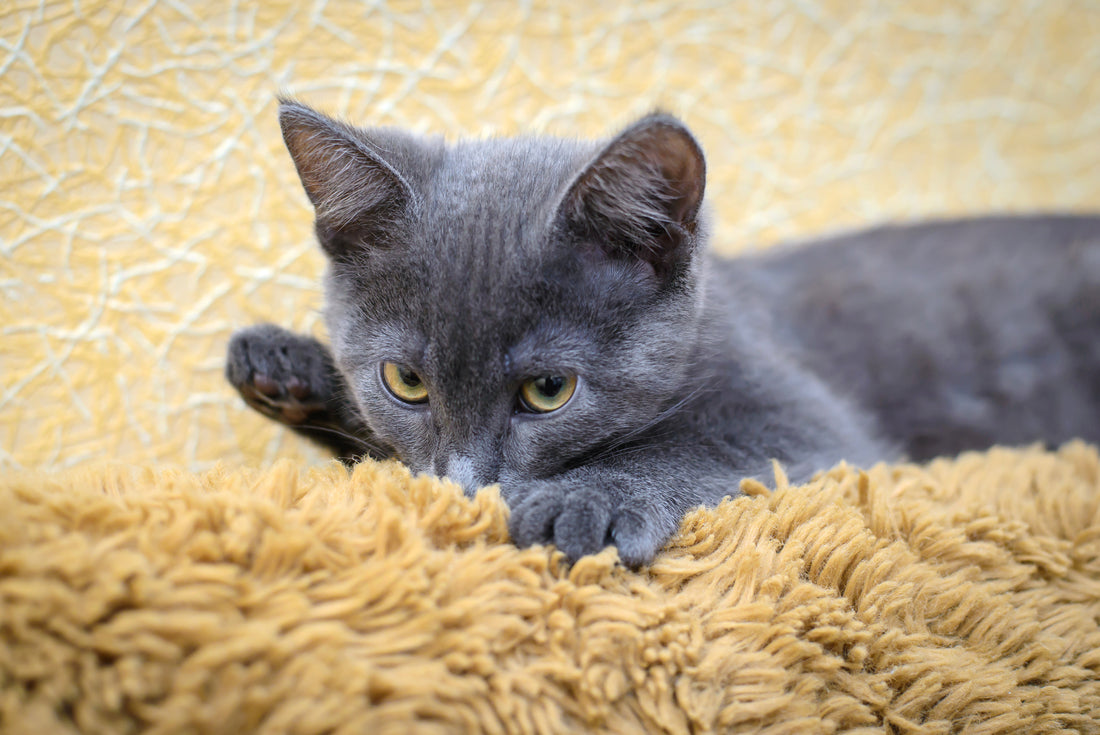
3 Reasons for Your Cat's Newfound Blanket Sucking Habit
Kittens and adult cats alike can develop some interesting habits that we humans find strange. Cats’ behaviors largely stem from evolutionary instincts and behaviors they learn as kittens from their siblings and mothers. One somewhat strange behavior cats may partake in is sucking or chewing on blankets or similar types of fabric.
The sucking behavior is often accompanied by purring and kneading. This behavior might perplex some pet owners or even make them nervous, since blanket chewing could potentially lead to upset stomachs or intestinal blockages. The habit can also lead to the destruction of some of your favorite blankets or sweaters.
As it turns out, there are more than a few reasons why cats might take up a blanket sucking habit either as a kitten or an adult. The reasons may differ with age, and each cat is unique, but the following three are the most common causes.

- Weaned too early: One of the most common reasons that kittens develop a blanket sucking habit is because they were separated from their mothers at too young of an age. When kittens are born, they typically stay with their mothers for around eight weeks. During this time, the kittens will knead on and suckle at their mothers’ nipples to nurse. If the kitten has been pulled away from their mother before eight weeks, or has been bottle fed since birth, they may attempt to “suckle” a blanket since it reminds them of a mother cat. The behavior is largely caused by instinct in your cat’s youth, but it could turn into a routine habit that lasts into adulthood.
- Comfort: Suckling at wool may provide cats with a sense of comfort or relaxation any time they feel stressed or just want to settle in to sleep. Nuzzling up to and suckling on something fuzzy harkens back to the nursing instinct in cats, which is closely linked to feelings of comfort and safety. Both kittens and adult cats may be inclined to develop this behavior.
- Anxiety: Cats dealing with significant anxiety or stress may develop a sudden blanket sucking habit as a way to soothe themselves during an overwhelming situation. If your adult cat suddenly starts sucking on blankets after changes in the household, stressful situations or the addition or loss of a pet, their behavior is likely tied to anxiety. This type of behavior can quickly turn into a form of obsessive-compulsive disorder, which can be difficult to break.
If kittens partake in blanket sucking when they are still young, it’s likely that they were weaned too young or are using blanket sucking as a form of self-comfort. Most kittens grow out of this behavior as they age, particularly as they eat more solid food and establish their places in the household. If the kitten does not grow out of the behavior, however, they may continue to do it well into adulthood.
If your adult cat begins sucking on blankets or fabric out of seemingly nowhere, you might want to be more concerned. The behavior may be rooted in anxiety or stress, which is bad for your cat for a number of reasons. It’s important to examine your cat’s environment; try to determine the source of their stress and mitigate it for your cat’s health and safety. If you are successful in finding and removing your cat’s source of stress, they may naturally stop sucking on fabric or exhibit the behavior far less frequently.
Is this habit one that needs to be broken?
In many cases, pet owners believe that blanket sucking is a habit they need to break. In reality, blanket sucking is not inherently dangerous for cats unless they begin to ingest the fabric and experience gastrointestinal upset or blockages. Additionally, if the behavior is tied to behavioral disorders or severe anxiety, the underlying problem should be addressed for many more reasons aside from the blanket sucking habit itself.
If your cat’s sucking habit is causing destruction or leading to health problems, you’ll want to try and curb the habit as early as possible. To do this, you’ll first need to ensure all their needs are being met. If it persists, try to divert your cat’s attention by playing with toys or by introducing a safer item for them to suck or chew on. If your cat prefers to suck or chew on one item in particular, try keeping it out of reach so your cat cannot access it. However, avoid removing the item from the cat if they are sucking on it to avoid causing additional stress.
With that said, unless your cat’s sucking habit is bad for them or your belongings, you can let your kitties soothe themselves in the ways they like best!


